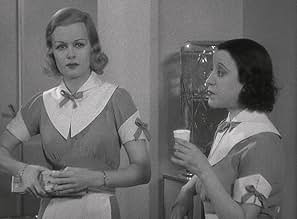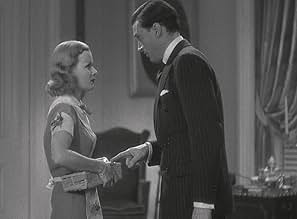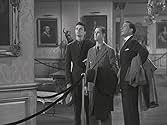IMDb RATING
6.5/10
1.3K
YOUR RATING
Sassy manicurist Eve Fallon is recruited as an even more brassy reporter and she helps police detective boyfriend Danny Barr break a jewel theft ring and solve the murder of a baby.Sassy manicurist Eve Fallon is recruited as an even more brassy reporter and she helps police detective boyfriend Danny Barr break a jewel theft ring and solve the murder of a baby.Sassy manicurist Eve Fallon is recruited as an even more brassy reporter and she helps police detective boyfriend Danny Barr break a jewel theft ring and solve the murder of a baby.
- Director
- Writers
- Stars
- Awards
- 2 wins total
Henry Brandon
- Don Butler
- (as Henry Kleinbach)
Fred Anderson
- Elevator Operator
- (uncredited)
William Arnold
- Customer
- (uncredited)
Mary Bovard
- Manicurist
- (uncredited)
Don Brodie
- Customer
- (uncredited)
Ralph Brooks
- Man Exiting Elevator
- (uncredited)
- Director
- Writers
- All cast & crew
- Production, box office & more at IMDbPro
Featured reviews
Big Brown Eyes would have been a big fat bomb if Cary Grant hadn't carried the movie. Even in such an early picture (1936) his debonair, yet cheeky gentleman style is evident. Playing a detective seemed odd, yet no matter what role he is cast in, he makes it his own. His romantic interest, Joan Bennett, seemed a tad too hard around the edges to play his girlfriend, but she did manage some decent repertoire with Grant, especially when the packing scene in Grant's apartment. Overall, the picture is uneven. It can't decide if it is a serious crime/drama or a light comedy. There is a scene where a stray bullet kills a baby (intimated) and there is nothing funny about that. Another scene a man is shot while arranging roses. It's incongruent action like these scenes that makes this movie just short of unwatchable. I have yet to see a Cary Grant movie that I didn't like, and this one seems a practice for his all out great flick His Gal Friday. Big Brown Eyes is watchable, only because of Cary Grant.
Yes, it's true. The actor who in a few years would become the ultimate symbol of film sophistication and elegance has the role of a policeman in this fairly routine comedy-drama. But no matter. Grant has enough charm and grace to make even this kind of part his own. How did he do it? Grant just stands out and is so likable while a lesser actor would just walk through this rather thankless assignment.
Joan Bennett played the kind of sassy brassy part that was often taken on by the likes of Ginger Rogers or Joan Blondell. Did anyone else catch her throwaway line that mirrored Mae West's famous "come up and see me sometime?" Many folks don't remember that Bennett was a blond BEFORE she became better known to later movie audiences as a brunette. Does anyone know of any other famous actress who made such a transition? Not me.
The rest of the cast did serviceable work in the film. Douglas Fowley, who played a humorous bit as one of the crooks, is far better known to most film audiences as the harried movie director in "Singing in the Rain," who had to deal with the chaotic and riotous problems of bringing sound to what were formerly silent movies.
But this film belongs to its male lead. You can almost see in watching the movies he made at this time just how he developed the layers of "business" that came together to produce the screen personality we all know as Cary Grant. He may have been paying his dues by taking on this fairly routine role. In the long run----we are all the better for it. Cary Grant was one of the greatest screen actors of all time----maybe the greatest.
Joan Bennett played the kind of sassy brassy part that was often taken on by the likes of Ginger Rogers or Joan Blondell. Did anyone else catch her throwaway line that mirrored Mae West's famous "come up and see me sometime?" Many folks don't remember that Bennett was a blond BEFORE she became better known to later movie audiences as a brunette. Does anyone know of any other famous actress who made such a transition? Not me.
The rest of the cast did serviceable work in the film. Douglas Fowley, who played a humorous bit as one of the crooks, is far better known to most film audiences as the harried movie director in "Singing in the Rain," who had to deal with the chaotic and riotous problems of bringing sound to what were formerly silent movies.
But this film belongs to its male lead. You can almost see in watching the movies he made at this time just how he developed the layers of "business" that came together to produce the screen personality we all know as Cary Grant. He may have been paying his dues by taking on this fairly routine role. In the long run----we are all the better for it. Cary Grant was one of the greatest screen actors of all time----maybe the greatest.
This little movie is more than forgotten. It is so mundane that no one has decided they can make a nickle from it, despite having some of the very same features and creative crew as projects that are celebrated. Cary Grant is about the same here, as in, say, "Charade."
I have to admit, it is flat. It all can be laid at the feet of the writer, I suppose.
These comedies are delicate. I suppose they cannot be engineered, like so much in film can. Oh, the execution can of course, but if the writer doesn't froth intuitively, nothing can spin it in after the fact.
But then again, this was the 30's where experimentation was the rule. And I suppose you need several failures before you get a "His Girl Friday" (which this resembles) out of so many tries.
Ted's Evaluation -- 1 of 3: You can find something better to do with this part of your life.
I have to admit, it is flat. It all can be laid at the feet of the writer, I suppose.
These comedies are delicate. I suppose they cannot be engineered, like so much in film can. Oh, the execution can of course, but if the writer doesn't froth intuitively, nothing can spin it in after the fact.
But then again, this was the 30's where experimentation was the rule. And I suppose you need several failures before you get a "His Girl Friday" (which this resembles) out of so many tries.
Ted's Evaluation -- 1 of 3: You can find something better to do with this part of your life.
Big Brown Eyes (1936)
Well, the big brown eyes that come to mind here belong to Cary Grant, who is coming into his own here. You'll recognize not only the looks (the eyes are heavier in the earlier films) but a mature attitude, the relaxed and cocky and sarcastic fellow that is so famous.
The leading woman is Joan Bennett, who plays Grant's love interest. Bennett is not well known as a type the way Crawford or other women from her period are, and it's partly because she plays a kind of generic character, in this case a blond, sweet, smart, fun woman. She actually became more famous later in a couple Fritz Lang dramas (as a brunette), also playing a type. what she had going for her was a natural and fluid ease before the camera. And an ability to fit a part, not steal the show.
Because the show belongs to Grant. And Grant here is a cop, Danny Barr. He tends to insert his casual confidence and slow ease as a cop and it's actually a pretty interesting fit, not at all the stereotype created by harder boiled types, or more witty ones (name a half a dozen famous ones). It's fascinating to watch him at this pivotal point in his career. It's usually pointed out that Grant's persona solidified in 1937 in "The Awful Truth" but having watched most of these films from this period it really seems that he's fully himself here, a year earlier. History is right in the sense that "The Awful Truth" pushed Grant's career up a notch simply because it's a better movie. And he has a more prominent role in it.
Here, the action is spread between Grant and his cops, Bennett and her life bouncing from being a manicurist to a reporter, and the "bad guys" who are up to their usual no good. These thugs are actually pretty convincing, falling short of the hardened awful types of some movies. One of them (the kingpin) is a young Walter Pidgeon, who is not quite right in his role, but it's fun to see him so early in his career.
"Big Brown Eyes" is poorly name, but besides that it's not a bad movie at all, and if you follow the several plot lines (all connected) it gets pretty interesting. Every now and then when the plot is sped up (thankfully) the camera shows a whole range of characters close up and at a tilt. It's both affected (a little at odds with the rest of the movie) and successful (at speeding up the plot with appropriate humor and agitation). There are some fun twists (like when Bennett accidentally makes a fingerprint dusting using some talcum powder. And there are lots of turns, people quitting jobs and leaving town, and some odd shocks, as when the baby is killed.
In the end it's also a romance with Grant in the lead role, well done and sharply acted. See it.
Well, the big brown eyes that come to mind here belong to Cary Grant, who is coming into his own here. You'll recognize not only the looks (the eyes are heavier in the earlier films) but a mature attitude, the relaxed and cocky and sarcastic fellow that is so famous.
The leading woman is Joan Bennett, who plays Grant's love interest. Bennett is not well known as a type the way Crawford or other women from her period are, and it's partly because she plays a kind of generic character, in this case a blond, sweet, smart, fun woman. She actually became more famous later in a couple Fritz Lang dramas (as a brunette), also playing a type. what she had going for her was a natural and fluid ease before the camera. And an ability to fit a part, not steal the show.
Because the show belongs to Grant. And Grant here is a cop, Danny Barr. He tends to insert his casual confidence and slow ease as a cop and it's actually a pretty interesting fit, not at all the stereotype created by harder boiled types, or more witty ones (name a half a dozen famous ones). It's fascinating to watch him at this pivotal point in his career. It's usually pointed out that Grant's persona solidified in 1937 in "The Awful Truth" but having watched most of these films from this period it really seems that he's fully himself here, a year earlier. History is right in the sense that "The Awful Truth" pushed Grant's career up a notch simply because it's a better movie. And he has a more prominent role in it.
Here, the action is spread between Grant and his cops, Bennett and her life bouncing from being a manicurist to a reporter, and the "bad guys" who are up to their usual no good. These thugs are actually pretty convincing, falling short of the hardened awful types of some movies. One of them (the kingpin) is a young Walter Pidgeon, who is not quite right in his role, but it's fun to see him so early in his career.
"Big Brown Eyes" is poorly name, but besides that it's not a bad movie at all, and if you follow the several plot lines (all connected) it gets pretty interesting. Every now and then when the plot is sped up (thankfully) the camera shows a whole range of characters close up and at a tilt. It's both affected (a little at odds with the rest of the movie) and successful (at speeding up the plot with appropriate humor and agitation). There are some fun twists (like when Bennett accidentally makes a fingerprint dusting using some talcum powder. And there are lots of turns, people quitting jobs and leaving town, and some odd shocks, as when the baby is killed.
In the end it's also a romance with Grant in the lead role, well done and sharply acted. See it.
Mega-stardom for Cary Grant still was ahead of him when he made this amiable romantic mystery with Joan Bennett, though the film is still well worth watching and is one of the better films in this era. By 1937-1939 he was pretty much a household name, with films such as THE AWFUL TRUTH, HOLIDAY and GUNGA DIN to his credit (BRINGING UP BABY was perhaps the best of the films of this time period, but in 1938 it was a financial flop).
As for Joan, though much of the film I thought she was her sister Constance, as Joan died her hair platinum blonde for the film and she's best known as a raven-haired actress. It's amazing how much alike they look given the same hair styles. She, too, had better and more popular films in the future and so this film is one from both their transitional periods--clearly they were stars, but not of the first order.
The film is a wonderful blend of comedy, romance and mystery and is one of the better examples of this odd genre combination. While it isn't up to the tip-top standards of THE THIN MAN (but what was?), it was certainly a very good film. What I liked best was the writing for Joan's character. She was a wonderful 'broad'--a worldly and wise lady who had some of the best one-liners I've ever heard in a film of the era. She was enticing AND mouthy at the same time--whatta dame! The mystery involves an evil private detective (Walter Pidgeon) who is not above a lot of larceny in order to make it in his racket. Not only does he find stolen items, but he's not above having others killed or dealing with crooks to get it. During most of the film, Grant plays a police detective (an odd casting decision, I know) who is in love with Joan AND is assigned to a case involving Pidgeon--though at this point, no one knows he's "Mr. Big" behind everything evil and corrupt Grant is investigating. Throughout the investigation, Joan in the role of a reporter, does amazingly well in helping her boyfriend and even though they snipe at each other a bit, they are a great screen couple.
Overall, a delightful film that is close to earning an 8. Very well written and surprisingly good for an earlier Grant film.
As for Joan, though much of the film I thought she was her sister Constance, as Joan died her hair platinum blonde for the film and she's best known as a raven-haired actress. It's amazing how much alike they look given the same hair styles. She, too, had better and more popular films in the future and so this film is one from both their transitional periods--clearly they were stars, but not of the first order.
The film is a wonderful blend of comedy, romance and mystery and is one of the better examples of this odd genre combination. While it isn't up to the tip-top standards of THE THIN MAN (but what was?), it was certainly a very good film. What I liked best was the writing for Joan's character. She was a wonderful 'broad'--a worldly and wise lady who had some of the best one-liners I've ever heard in a film of the era. She was enticing AND mouthy at the same time--whatta dame! The mystery involves an evil private detective (Walter Pidgeon) who is not above a lot of larceny in order to make it in his racket. Not only does he find stolen items, but he's not above having others killed or dealing with crooks to get it. During most of the film, Grant plays a police detective (an odd casting decision, I know) who is in love with Joan AND is assigned to a case involving Pidgeon--though at this point, no one knows he's "Mr. Big" behind everything evil and corrupt Grant is investigating. Throughout the investigation, Joan in the role of a reporter, does amazingly well in helping her boyfriend and even though they snipe at each other a bit, they are a great screen couple.
Overall, a delightful film that is close to earning an 8. Very well written and surprisingly good for an earlier Grant film.
Did you know
- TriviaAt 20 minutes, Eve Fallon (Joan Bennett) says to Danny Barr (Cary Grant), with a flirtatious wink, "if you happen to be around my way, come up and see me some time". This appears to refer to a famous, almost identical line said by Mae West to Cary Grant in "She Done Him Wrong" (1933), a playful in-joke that would have been obvious to contemporary audiences.
- Quotes
Richard Morey: Cortig, if you bought a gift for a girl and she refused to accept it, what would you do?
Russ Cortig: [with a slow smile] I'd give it to my wife.
- ConnectionsFeatured in The True Adventures of Raoul Walsh (2014)
- How long is Big Brown Eyes?Powered by Alexa
Details
- Runtime
- 1h 17m(77 min)
- Color
- Aspect ratio
- 1.37 : 1
Contribute to this page
Suggest an edit or add missing content


































